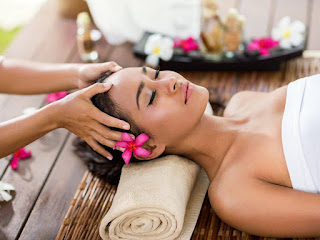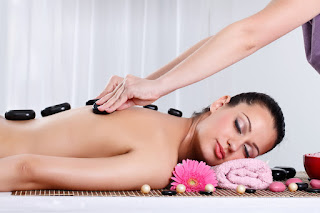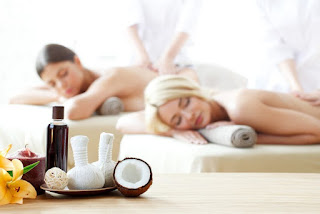 |
| health spa |
In addition to exercise classes and equipment, a variety of treatments are available at modern spas. Although many of the claims made about the treatments have not been proven and are often misleading, there is no doubt that they are relaxing and cause a sense of well being. The relationship between the emotions and physical health are well accepted, and therefore the relaxation derived from these treatments may well have a positive impact on physical health. Some of these treatments are described below.
Aromatherapy involves body, face, and/or scalp massage with aromatic essential oils extracted from plants, trees and flowers that are believed to provide therapeutic benefits. The theory is that the olfactory system (associated with the sense of smell) converts scents into signals that travel to the portion of the brain known as the limbic system. The limbic system is a very primitive portion of the brain and is involved in generation of emotions and primal urges. These signals provide a pathway to our emotions and memories, along with affecting physical changes in our body such as appetite and stress level. Generally, the therapeutic benefits of aromatherapy have not been verified by scientific investigation, however the ability of fragrant oils to induce relaxation is widely accepted. A cautionary note is that while "natural" is frequently equated with "safe", essential oils can cause allergic reactions and skin sensitization in some individuals. Most are diluted with a carrier oil before use.
 |
| health spa resorts |
Several oils are frequently used in aromatherapy. Lavender oil has been incorporated into many topical products for its ability to induce relaxation. The delightful fragrance emitted from lavender pillows have made them very popular, however some have developed sensitive skin condition from their use. A scalp massage with oil containing thyme, rosemary, lavender, and cedarwood was reported by one group to cause a mild stimulation of hair growth. Bergamot oil is a favorite among many individuals and is associated with the scent of Earl Gray Tea. Although it can cause sensitization, it has been used with UV light treatment for people with psoriasis, vitilago and some fungal infections. The flavonoids and pectin from oil of the bitter orange peel and flower may be used in foot rubs due to its antifungal activity in the presence of Athlete’s Foot (tinea pedis).
Body Scrubs are performed with many combinations of substances including sea salt, red clay salts, essential oils, ground almonds, and sugar. A loofah sponge may be used to provide exfoliating action and is sometimes used with mixture of sea salt and warm almond or avocado oil. These invigorating treatments remove the outer dead skin cells, leaving the skin with a temporary pink glow and a smoother feel. They do not have any internal detoxifying abilities.
Body Wraps involve applying a substance such as clay, an essential oil, or an amino acid solution and then wrapping the body in hot linens, plastic sheets or blankets. The heat induced sweating that occurs can temporarily cause loss of inches, but they do not stimulate metabolism enough to cause fat or weight loss. Toxins are not eliminated to an extent greater than that which occurs with sweating.
Lymph drainage by manual compression is sometimes used to mobilize accumulated edema fluid and increase lymph flow. Lymph is a fluid collected from tissues and returned to the blood by way of the lymphatic vessels. If the lymphatic vessels or lymph nodes become obstructed, often after surgery or radiation therapy, edema fluid can accumulate and cause swelling.
Facials can contain many different ingredients designed to cleanse and hydrate the skin on the face and neck. After thorough cleansing and steaming, blackheads and whiteheads may be extracted before application of a mask. Masks are tailored for the individual’s needs, particularly addressing the problems of acne or aging skin. People with acne often receive a clay containing substance due to their oil absorbing properties. Many masks contain extracts from seaweed that contain amino acids, vitamins, minerals and trace elements. There is very little evidence that these substances can penetrate the upper layers of dead skin cells and affect the living cells of the dermis and epidermis. Some of the effects described for these ingredients have been tested on cells growing in culture dishes or are generalized effects of, for example, vitamins or minerals ingested orally. The same is true for ingredients in most other masks. They may however provide cleansing, soothing and hydrating effects to the skin. After the facial, the skin generally feels smooth and soft, and the client is relaxed.
 |
| health spa near me |
Baths & associated therapies
Balneotherapy refers to therapy associated with bathing. Balneotherapy usually incorporates the use of substances found in nature, such as sea or mineral water and peat substances in heated submersion baths. They have been used for their ability to relieve pain and improve the general sense of well being. Although they are relaxing and provide relief for sore muscles, there is insufficient evidence to support their claims of immune stimulating and detoxifying abilities.
Jacuzzi therapy involves soaking in a tub or pool of circulating, warm (or hot) water containing air bubbles. It increases circulation and causes relaxation and a general feeling of well being. Many people claim a therapeutic benefit of easing soreness in the muscles or pain in the joints.
Thalassotherapy, derived from the Greek word thalassos meaning "sea", involves treatments that incorporate the use of seawater and seaweed. It includes seawater baths, algae masks and wraps. Seaweed is believed by some to be nature’s source of complete and balanced nutrients, containing many elements that are essential to the human body. The chemical composition of seawater is similar to human plasma, however the protective nature of the skin does not allow most of these ingredients to penetrate to the lower living layers of skin cells. There have been anecdotal reports of the benefits of seawater experienced by people with atopic dermatitis or psoriasis. At spas, the seawater bath is usually heated to approximately 105°F. It provides relaxation and often soothes sore muscles.
Paraffin wax baths have been used for many years to provide relief from joint pain of the hands and feet, particularly in patients with arthritis. In addition to treatment of the extremities, many spas now offer total body wax treatments. Warm wax is brushed over the body which is then wrapped in cloth or another covering in order to induce sweating. The treatment provides relaxation and leaves the skin feeling soft and moisturized.
Steam baths are similar to saunas but use steam to promote perspiration. Evaporation of sweat does not occur in a steam bath, so there is little or no loss of body heat as occurs in a sauna. The heat may feel more intense than in a sauna. Some people with sinus or allergy problems like the effects of steam baths to loosen secretions.
Saunas offer a heat treatment in a wood lined room to make the body perspire. The air can be relatively dry, or water can be sprinkled on the walls or over the stones in the sauna to increase humidity. Since the skin is an excretory organ, sweating causes the elimination of some waste products, which causes many to claim that saunas have a detoxifying effect. In any event, they are relaxing and impart a temporary glow to the skin.
Jacuzzi therapy involves soaking in a tub or pool of circulating, warm (or hot) water containing air bubbles. It increases circulation and causes relaxation and a general feeling of well being. Many people claim a therapeutic benefit of easing soreness in the muscles or pain in the joints.
Thalassotherapy, derived from the Greek word thalassos meaning "sea", involves treatments that incorporate the use of seawater and seaweed. It includes seawater baths, algae masks and wraps. Seaweed is believed by some to be nature’s source of complete and balanced nutrients, containing many elements that are essential to the human body. The chemical composition of seawater is similar to human plasma, however the protective nature of the skin does not allow most of these ingredients to penetrate to the lower living layers of skin cells. There have been anecdotal reports of the benefits of seawater experienced by people with atopic dermatitis or psoriasis. At spas, the seawater bath is usually heated to approximately 105°F. It provides relaxation and often soothes sore muscles.
Paraffin wax baths have been used for many years to provide relief from joint pain of the hands and feet, particularly in patients with arthritis. In addition to treatment of the extremities, many spas now offer total body wax treatments. Warm wax is brushed over the body which is then wrapped in cloth or another covering in order to induce sweating. The treatment provides relaxation and leaves the skin feeling soft and moisturized.
Steam baths are similar to saunas but use steam to promote perspiration. Evaporation of sweat does not occur in a steam bath, so there is little or no loss of body heat as occurs in a sauna. The heat may feel more intense than in a sauna. Some people with sinus or allergy problems like the effects of steam baths to loosen secretions.
Saunas offer a heat treatment in a wood lined room to make the body perspire. The air can be relatively dry, or water can be sprinkled on the walls or over the stones in the sauna to increase humidity. Since the skin is an excretory organ, sweating causes the elimination of some waste products, which causes many to claim that saunas have a detoxifying effect. In any event, they are relaxing and impart a temporary glow to the skin.








0 komentar: